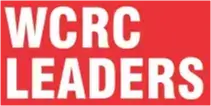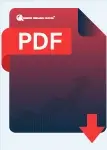Neurocognitive Assessment and Rehabilitation Market Overview:
As per MRFR analysis, the Neurocognitive Assessment and Rehabilitation Market Size was estimated at 7.27 (USD Billion) in 2022. The Neurocognitive Assessment and Rehabilitation Market Industry is expected to grow from 7.83(USD Billion) in 2023 to 15.4 (USD Billion) by 2032. The Neurocognitive Assessment and Rehabilitation Market CAGR (growth rate) is expected to be around 7.8% during the forecast period (2024 - 2032).
Key Neurocognitive Assessment and Rehabilitation Market Trends Highlighted
The global neurocognitive assessment and rehabilitation market is influenced by several important drivers, including the rising prevalence of neurological disorders, an aging population, and advancements in technology. As chronic conditions such as dementia and traumatic brain injury become more common, there is an increasing demand for effective assessment and rehabilitative tools. Enhanced awareness about mental health issues is also propelling this market forward. Additionally, the integration of telehealth and digital solutions is making neurocognitive assessments more accessible, catering to the needs of diverse patient populations. Opportunities in this market are vast, particularly with the growing emphasis on personalized treatment approaches.Companies can explore innovative solutions that combine artificial intelligence and machine learning to create tailored rehabilitation programs. Furthermore, partnerships with healthcare providers and research institutions can facilitate the development of new tools for better assessment and monitoring of patient progress. Exploring emerging markets offers a chance to implement localized strategies that cater to specific cultural and healthcare nuances, ultimately expanding the market reach. In recent times, there has been a notable shift towards digital platforms for neurocognitive assessments, significantly changing how patients are treated.This trend reflects the increasing acceptance of remote assessments and interventions, driven by the need for convenience and efficiency. Innovations in virtual reality and gamification are being employed to enhance engagement in rehabilitation practices. As research progresses and new methodologies are developed, the market is likely to experience further evolution, indicating a dynamic landscape that consistently adapts to meet the needs of healthcare providers and patients alike
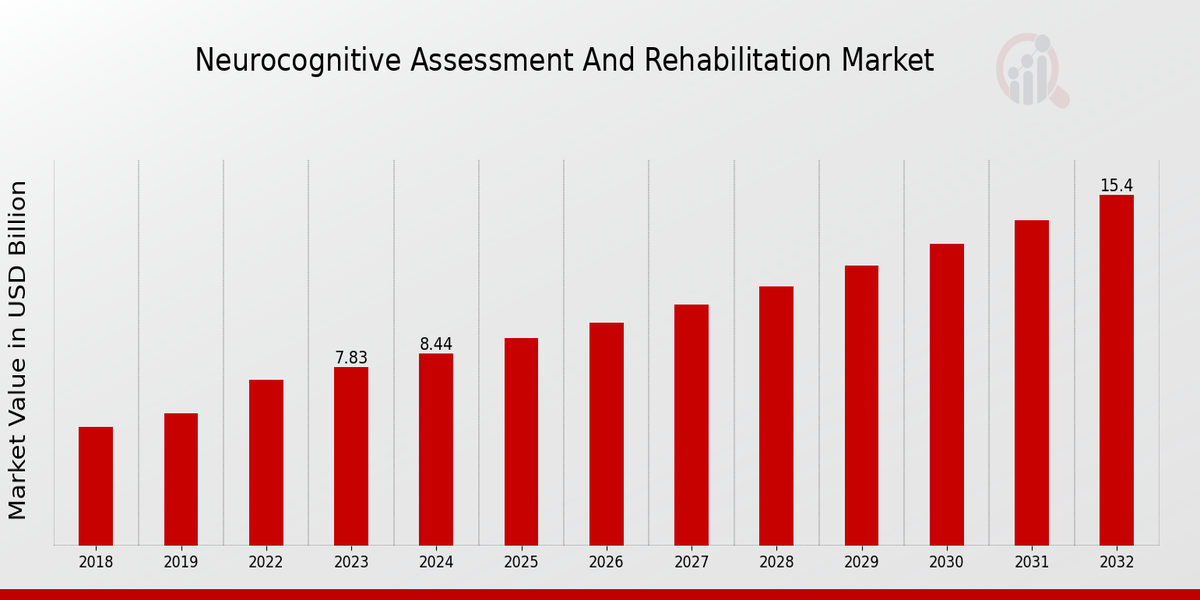
Source: Primary Research, Secondary Research, MRFR Database and Analyst Review
Neurocognitive Assessment and Rehabilitation Market Drivers
Increasing Prevalence of Neurocognitive Disorders
The growing prevalence of neurocognitive disorders such as dementia, Alzheimer's disease, and traumatic brain injury is driving significant demand within the Global Neurocognitive Assessment and Rehabilitation Market Industry. As global populations age, there is a noticeable rise in the number of individuals affected by cognitive deficits, necessitating effective assessment and rehabilitation solutions. The increasing burden of these disorders on healthcare systems is prompting stakeholders to invest in advanced neurocognitive assessment tools and rehabilitation methods that can improve patient outcomes.With the market expected to grow substantially in the coming years, innovations in neuroimaging techniques, cognitive training programs, and tele-rehabilitation services are becoming vital components in addressing the needs of patients and their caregivers. Furthermore, the emphasis on early diagnosis and intervention adds another layer of urgency to the demand for neurocognitive assessment solutions, as timely treatment can significantly alter the progression of these disorders and enhance the quality of life for patients.This trend is catalyzing the adoption of comprehensive evaluation processes and personalized rehabilitation plans, reinforcing the continual advancement of the Global Neurocognitive Assessment and Rehabilitation Market Industry.
Technological Advancements in Neurocognitive Assessment Tools
The development of advanced technologies is revolutionizing the landscape of the Global Neurocognitive Assessment and Rehabilitation Market Industry. Innovations such as artificial intelligence, machine learning, and mobile health applications are enhancing the accuracy and efficiency of neurocognitive assessments. These technologies facilitate real-time data collection and analysis, allowing for immediate feedback and tailored rehabilitation strategies to meet the specific needs of patients.The integration of wearable devices and telemedicine platforms is further expanding access to neurocognitive evaluations, especially for populations in remote or underserved areas. As technology continues to evolve, it is expected that the capabilities of neurocognitive assessment tools will expand, thereby improving the overall efficacy of rehabilitation programs. This continual enhancement of tools and methodologies is essential for meeting the growing demands of healthcare providers and patients within the industry.
Rising Awareness and Focus on Mental Health
Growing recognition of mental health's essential role in overall well-being is propelling the Global Neurocognitive Assessment and Rehabilitation Market Industry forward. Advocacy efforts aimed at de-stigmatizing cognitive disorders and emphasizing the importance of mental health care have increased public awareness. This heightened awareness leads to more individuals seeking assessments and rehabilitation services, which in turn generates market growth.As mental health is increasingly viewed as a critical component of healthcare, governments and organizations are prioritizing resources for cognitive assessments, resulting in a more robust infrastructure for neurocognitive care. Additionally, educational initiatives aimed at highlighting the signs of cognitive decline are encouraging early intervention, further solidifying the demand for neurocognitive rehabilitation services. Stakeholders in this industry are leveraging this growing awareness to promote more efficient and effective assessment protocols and rehabilitation techniques.
Neurocognitive Assessment and Rehabilitation Market Segment Insights:
Neurocognitive Assessment and Rehabilitation Market Assessment Type Insights
The Global Neurocognitive Assessment and Rehabilitation Market is observing significant growth, particularly in the Assessment Type segment. As of 2023, the total market is valued at 7.83 USD Billion, reflecting a strong demand for effective neurocognitive solutions. Within this segment, the Cognitive Assessment type stands out with a market valuation of 3.6 USD Billion, projected to rise to 7.22 USD Billion by 2032, evidencing its importance in evaluating cognitive functions such as memory, attention, and problem-solving skills. This type dominates the market as it is crucial for diagnosing various neurological disorders and cognitive impairments, underscoring its value in the healthcare sector.The Behavioral Assessment, with a valuation of 2.1 USD Billion in 2023 and anticipated growth to 4.25 USD Billion by 2032, plays a significant role in understanding patients' behaviors and emotional responses, which is vital for customized treatment plans. This assessment type is particularly relevant in settings that require an understanding of psychological factors influencing patient care. Lastly, the Functional Assessment is valued at 2.13 USD Billion in 2023 and expected to grow to 4.93 USD Billion by 2032. It focuses on evaluating the daily functioning and quality of life of patients, which is significant for rehabilitation strategies.Together, these assessment types reflect the increasing recognition of comprehensive approaches in neurocognitive assessment and rehabilitation, driven by factors such as rising neurological disorders and the growing demand for personalized healthcare solutions. The Global Neurocognitive Assessment and Rehabilitation Market data highlights the distinct contributions of each assessment type to overall market growth, supported by dynamic market trends and an increasing number of healthcare initiatives aimed at improving neurocognitive health.
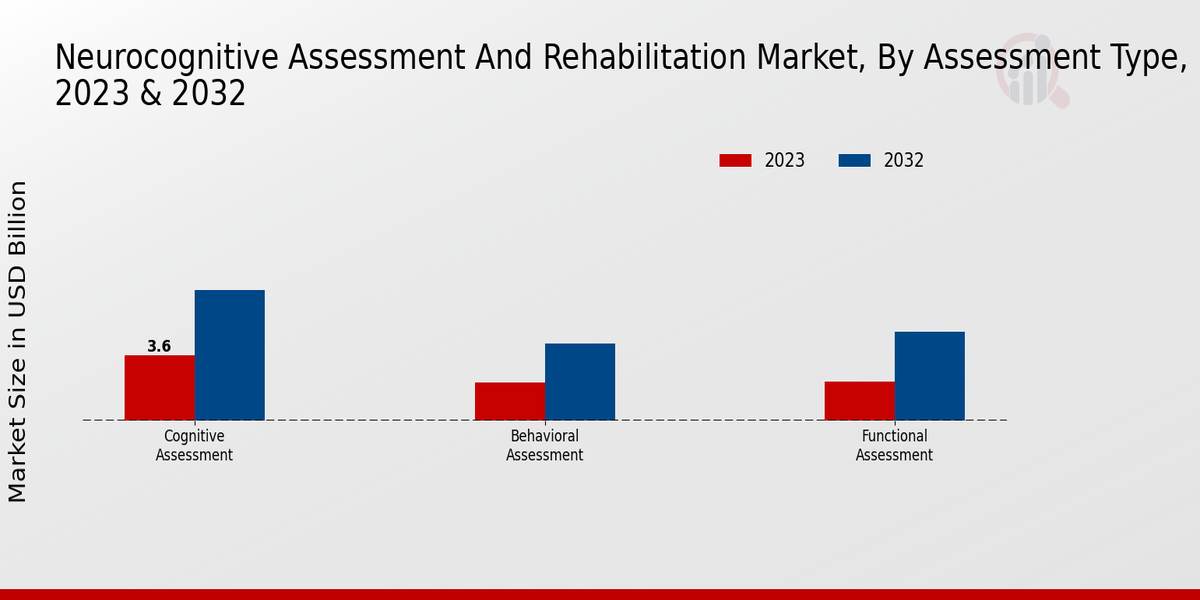
Source: Primary Research, Secondary Research, MRFR Database and Analyst Review
Neurocognitive Assessment and Rehabilitation Market Application Insights
The Global Neurocognitive Assessment and Rehabilitation Market, valued at 7.83 USD Billion in 2023, is witnessing significant growth, particularly within the Application segment, which encompasses Clinical Evaluation, Educational Settings, and Research Development.
Each of these areas plays a critical role in addressing neurocognitive challenges, with Clinical Evaluation being essential for diagnosing and monitoring cognitive impairments. Educational Settings are growing increasingly important as they integrate cognitive assessment tools to enhance learning capabilities and support students with cognitive difficulties.Research Development thrives by innovating new therapies and assessment techniques, driving advancements in the industry. The market growth is fueled by rising awareness and the need for effective diagnosis and intervention strategies, while challenges such as the integration of new technologies and the need for standardization remain.
The Global Neurocognitive Assessment and Rehabilitation Market data suggests a robust demand across these applications as the focus transitions toward holistic care and personalized rehabilitation solutions. Market trends also highlight increasing investments in advanced assessment technologies to improve patient outcomes and facilitate better educational support systems.Overall, the market statistics and segmentation indicate a dynamic landscape conducive to ongoing growth and innovation.
Neurocognitive Assessment and Rehabilitation Market Therapy Type Insights
The Global Neurocognitive Assessment and Rehabilitation Market, valued at 7.83 billion USD in 2023, has shown notable diversity in its Therapy Type segmentation, which includes Cognitive Behavioral Therapy, Occupational Therapy, and Speech Therapy. Cognitive Behavioral Therapy plays a vital role in addressing various psychological challenges and enhancing functionality and mental well-being.
Occupational Therapy is significant as it aids individuals in regaining daily living skills, thereby promoting independence and integration into society. Speech Therapy is a key focus to assist those with communication issues, facilitating essential interactions in personal and professional realms.Together, these therapies contribute substantially to the market's growth, driven by the increasing prevalence of neurocognitive impairments and a rising demand for personalized rehabilitation programs. The Global Neurocognitive Assessment and Rehabilitation Market statistics reflect an industry that is evolving with the integration of advanced technologies and therapeutic methods, responding to the complex needs of individuals requiring neurocognitive assessment and rehabilitation. Opportunities abound as awareness of neurocognitive disorders grows, placing pressure on health systems to adapt and invest in effective treatment solutions enhancing overall market dynamics.
Neurocognitive Assessment and Rehabilitation Market End User Insights
The Global Neurocognitive Assessment and Rehabilitation Market reached a valuation of 7.83 billion USD in 2023, indicating a thriving landscape driven by various end users. Hospitals play a critical role in this market as they provide immediate assessment and rehabilitation services for patients with neurocognitive disorders, making them a key player in delivering timely interventions. Rehabilitation Centers are essential as they focus on patient recovery, utilizing specialized programs and technologies to enhance cognitive functions.Research Institutions contribute significantly by advancing knowledge and developing innovative solutions for neurocognitive assessments and therapies, ensuring continuous growth in this sector. This structured distribution of end users supports the market's overall growth and diversification, responding to increased healthcare demands and enhanced awareness regarding neurocognitive health.
With the Global Neurocognitive Assessment and Rehabilitation Market statistics showing a robust upward trend, emerging technologies and evolving treatment methodologies present abundant opportunities, although challenges remain in standardizing practices across different facilities.The combination of these factors fuels positive market growth, ultimately benefiting patients and healthcare providers alike.
Neurocognitive Assessment and Rehabilitation Market Regional Insights
The Global Neurocognitive Assessment and Rehabilitation Market is expected to see significant growth across various regions. North America holds a major share with a valuation of 3.12 USD Billion in 2023 and is projected to grow to 6.15 USD Billion by 2032. This dominance is driven by advanced healthcare infrastructure and increased awareness of neurocognitive disorders. Europe followed with a valuation of 2.07 USD Billion in 2023 and an expected growth of 4.14 USD Billion in 2032, benefiting from stringent healthcare policies and a growing aging population.The APAC region was valued at 1.76 USD Billion in 2023, projected to reach 3.78 USD Billion in 2032, reflecting rising investment in healthcare technologies and a focus on mental health. South America, valued at 0.53 USD Billion in 2023 and increasing to 1.1 USD Billion in 2032, indicates a growing recognition of neurocognitive health. MEA region, with a market value of 0.35 USD Billion in 2023 and expected to advance to 0.83 USD Billion in 2032, faces challenges such as varying healthcare access, making its growth more restrained.Overall, the regional dynamics highlight varying levels of investment and development in neurocognitive health solutions, impacting the Global Neurocognitive Assessment and Rehabilitation Market revenue.
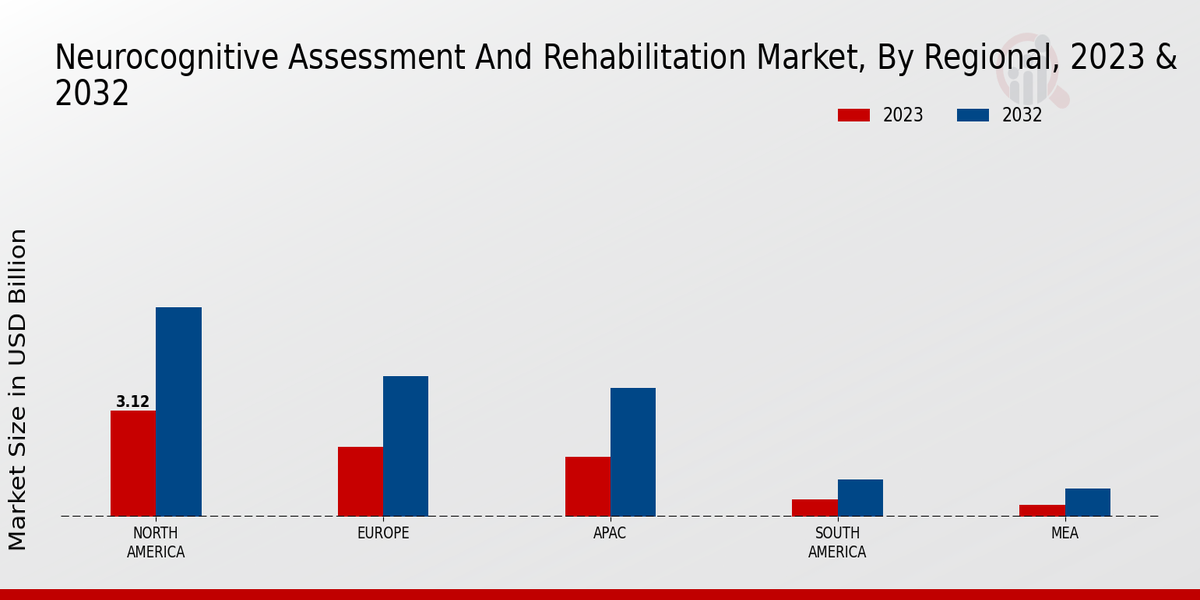
Source: Primary Research, Secondary Research, MRFR Database and Analyst Review
Neurocognitive Assessment and Rehabilitation Market Key Players and Competitive Insights:
The Global Neurocognitive Assessment and Rehabilitation Market has been evolving rapidly, driven by an increasing focus on mental health, cognitive functionality, and rehabilitation technologies. As neurological disorders and cognitive impairments become more prevalent due to aging populations and other factors, the market is witnessing significant competition among key players who are innovating to provide effective solutions for assessment and rehabilitation. The competitive landscape is characterized by a diverse set of companies offering a variety of products, services, and technologies specifically targeting cognitive health. This dynamic environment is marked by the adoption of advanced methodologies such as artificial intelligence, machine learning, and gamification to improve patient engagement and treatment efficacy. Companies are also investing heavily in research and development to create comprehensive solutions that encompass a range of cognitive assessments and rehabilitation exercises, thereby catering to the needs of varied customer bases, including healthcare providers, educational institutions, and individual consumers.Brighter Vision operates within the competitive domain of the Global Neurocognitive Assessment and Rehabilitation Market with a robust portfolio centered on enhanced cognitive solutions. The company distinguishes itself by creating user-friendly platforms designed for both clinical and personal use, thereby appealing to a wide audience in need of cognitive assessments and rehabilitation tools. Its strengths lie in its commitment to evidence-based practices and a deep understanding of cognitive health challenges faced by different demographics. Brighter Vision emphasizes personalized therapeutic approaches, utilizing innovative technology to develop tailored cognitive training programs that yield measurable improvements in mental acuity and functional performance. This focus on patient-centered solutions allows the company to build strategic partnerships with healthcare providers, solidifying its presence in the market while ensuring that users receive optimal support throughout their cognitive rehabilitation journey.CogniFit positions itself as a notable competitor in the Global Neurocognitive Assessment and Rehabilitation Market by offering a diverse range of scientifically validated cognitive training tools. The company's strength lies in its extensive research background and partnerships with leading experts in neuroscience, enabling it to integrate cutting-edge methodologies into its offerings. CogniFit's digital platforms are designed to adapt to different cognitive needs, catering to patients with various neurological conditions and age groups, from children to seniors. By making cognitive health accessible through engaging and interactive applications, CogniFit creates a holistic approach that not only aids in assessment but also promotes ongoing cognitive wellness. Furthermore, its emphasis on customizable training experiences helps users track their progress, enhancing user engagement and satisfaction, which ultimately contributes to its competitive advantage in the neurocognitive marketplace.
Key Companies in the Neurocognitive Assessment and Rehabilitation Market Include:
- Brighter Vision
- CogniFit
- Cambridge Cognition
- Cognifit
- MindMaze
- Cogstate
- NEUROvations
- Schoen Clinic
- Concussion Vital Signs
- Thrive Global
- Kryterion
- MediBrain
- Pearson
- Lumosity
- NeuroTrack
Neurocognitive Assessment and Rehabilitation Market Industry Developments
Recent developments in the Global Neurocognitive Assessment and Rehabilitation Market indicate a dynamic environment marked by technological advancements and strategic partnerships. Companies like CogniFit and MindMaze have unveiled new platforms aimed at enhancing cognitive rehabilitation in various patient demographics, leveraging AI and machine learning for improved efficacy. Cambridge Cognition has reported a growing demand for their digital assessments which are increasingly integrated into clinical practices for conditions such as dementia and traumatic brain injuries.
Additionally, Cogstate has recently expanded its market presence through innovative cognitive testing solutions targeting the sports medicine and education sectors. On the MA front, companies are actively pursuing collaborations to bolster their portfolios; NEUROvations has entered into strategic alliances to enhance its neurocognitive solutions portfolio.
The ongoing digital transformation within the sector, coupled with cross-sector partnerships, is expected to significantly influence market growth, with valuations reaching new heights as public awareness and demand for cognitive health solutions increase. These trends reflect a robust response to the growing need for effective neurocognitive assessments and rehabilitative therapies amid an aging global population and rising mental health concerns.
Neurocognitive Assessment and Rehabilitation Market Segmentation Insights
Neurocognitive Assessment and Rehabilitation Market Assessment Type Outlook
- Cognitive Assessment
- Behavioral Assessment
- Functional Assessment
Neurocognitive Assessment and Rehabilitation Market Application Outlook
- Clinical Evaluation
- Educational Settings
- Research Development
Neurocognitive Assessment and Rehabilitation Market Therapy Type Outlook
- Cognitive Behavioral Therapy
- Occupational Therapy
- Speech Therapy
Neurocognitive Assessment and Rehabilitation Market End User Outlook
- Hospitals
- Rehabilitation Centers
- Research Institutions
Neurocognitive Assessment and Rehabilitation Market Regional Outlook
- North America
- Europe
- South America
- Asia-Pacific
- Middle East and Africa
| Report Attribute/Metric |
Details |
| Market Size 2022 |
7.27(USD Billion) |
| Market Size 2023 |
7.83(USD Billion) |
| Market Size 2032 |
15.4(USD Billion) |
| Compound Annual Growth Rate (CAGR) |
7.8% (2024 - 2032) |
| Report Coverage |
Revenue Forecast, Competitive Landscape, Growth Factors, and Trends |
| Base Year |
2023 |
| Market Forecast Period |
2024 - 2032 |
| Historical Data |
2019 - 2022 |
| Market Forecast Units |
USD Billion |
| Key Companies Profiled |
Brighter Vision, CogniFit, Cambridge Cognition, Cognifit, MindMaze, Cogstate, NEUROvations, Schoen Clinic, Concussion Vital Signs, Thrive Global, Kryterion, MediBrain, Pearson, Lumosity, NeuroTrack |
| Segments Covered |
Assessment Type, Application, Therapy Type, End User, Regional |
| Key Market Opportunities |
Aging population increase, Technological advancements in assessments, Growing demand for personalized therapy, Rising prevalence of neurological disorders, Expanding telehealth services |
| Key Market Dynamics |
Rising prevalence of neurological disorders, Increasing investment in healthcare technologies, Growing demand for personalized rehabilitation, Advancements in cognitive assessment tools, Expanding geriatric population worldwide |
| Countries Covered |
North America, Europe, APAC, South America, MEA |
Frequently Asked Questions (FAQ) :
The Global Neurocognitive Assessment and Rehabilitation Market is expected to be valued at 15.4 USD Billion in 2032.
The expected CAGR for the Global Neurocognitive Assessment and Rehabilitation Market from 2024 to 2032 is 7.8%.
The Cognitive Assessment segment is expected to be valued at 7.22 USD Billion in 2032.
Major players include Brighter Vision, CogniFit, Cambridge Cognition, and MindMaze, among others.
The Behavioral Assessment segment is projected to reach 4.25 USD Billion in 2032.
The Functional Assessment segment is expected to be valued at 4.93 USD Billion in 2032.
The growth drivers include advancements in technology and the increasing prevalence of neurocognitive disorders.

